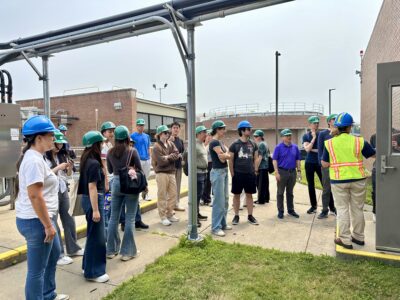By Caroline Berman
On May 29, the newest cohort of Columbia University’s Master of Public Administration in Environmental Science and Policy (MPA-ESP) began their workshop course, a distinguishing feature of their year-long program. MPA-ESP students in the Workshop in Applied Earth Systems Management course work in groups to analyze the scientific background and implementation of proposed United States environmental bills. During the students’ summer semester, they investigate the scientific issues behind the greater problem their bill seeks to address, and prepare themselves to deliver this information to policy makers without scientific backgrounds. The cohort will continue their team’s work in the fall semester, then focusing on how to implement the program outlined in their bill.
Students will have the opportunity to use these practical skills in their future careers and during their final semester of the program when they will complete a team project for a government or non-profit client.
Read on to learn about the five bills the current MPA-ESP cohort is studying.
Coastal Communities Adaptation Act: H.R. 1317
Faculty Advisor: Howard Apsan

As natural disasters and climate change worsen, this bill focuses on the urgent need to improve the resilience of both built and natural environments in U.S. coastal communities. H.R. 1317 aims to direct grants and other funding toward research into improving resilience and to catalog previous risk reduction and resilience research. The federal bill also proposes funding a resilience revolving fund for each coastal state, as well as financing prize competitions for coastal risk reduction and creating a US Postal Service stamp that will raise funds for climate change adaptation.
Creation of a Department of Sustainability and Climate Change and Repealing Section 20 of Chapter 1 of the NYC Charter: Int 1399-2019
Faculty Advisor: Steve Cohen

The current Office of Sustainability works with the other offices under the New York City Mayor’s Office Climate Policy and Program team to manage the OneNYC program and combat climate change in the city. However, as the impacts of climate change continue to grow, demand to address the challenge has grown in kind, leading to the motion for a new agency to fight this problem. Int. No. 1399 proposes replacing the Office of Sustainability with a new Department of Sustainability and Climate Change, which will operate separately from the Mayor’s office. The commissioner heading this new department will work to improve the city’s resiliency through policy implementation and raising public awareness, as well as developing measurable sustainability indicators for success. The bill also involves creating a Sustainability Advisory Board of stakeholders from various sectors and an interagency “Green Team” to investigate innovations in relevant technologies.
SAVE Right Whales Act of 2019: H.R. 1568
Faculty Advisor: Bob Cook

This federal bill seeks to finance improved protections for the endangered North Atlantic right whale (Eubalaena glacialis), a species once abundant along the European and North American coasts, but now consisting of only 411 whales in the North American population. While whaling has been outlawed in the region for years, other human threats, namely ship strikes and entanglement, continue to threaten these whales’ lives. Their habitat range continues to shift north as climate change warms the oceans and the whales follow their food source (plankton) to cooler, less protected waters. H.R. 1568 aims to finance multi-year grants to expert groups for further whale conservation and to perform a survey of plankton in partnership with Canada’s government to help predict the right whale’s future feeding locations.
Northern Rockies Ecosystem Protection Act of 2019: H.R. 1321
Faculty Advisor: Matthew Palmer

The Rocky Mountains supply many ecosystem services to the region, such as producing freshwater, sequestering carbon, and providing wildlife habitats. Many areas in the Northern Rockies are still undeveloped, but are open to industries like timber as well as mineral, oil and gas extraction. If these industries are allowed to extract resources unchecked, it could lead to irreversible ecosystem deterioration that impacts climate change, water quality, soil erosion, and local economies. H.R. 1321 would designate areas of the Northern Rockies as “wilderness, wild and scenic rivers, wildland recovery areas, and biological connecting corridors,” which would receive higher levels of protection. Additionally, the bill would provide opportunity to rehabilitate damaged federal lands.
Saving America’s Pollinators Act of 2019: H.R. 1337
Faculty Advisor: Louise Rosen

The decline in pollinator populations, especially bees, has been highly publicized in recent years as it threatens the global food system. One risk for bees and other pollinator populations is the increased use of neonicotinoids, a class of insecticides, over the past couple of decades. These chemicals have been shown to increase bee mortality, impair pollinator feeding and lead to heightened bee colony collapse. This federal bill would create the Pollinator Protection Board under the U.S. Environmental Protection Agency (EPA). This board would research pesticide impacts on pollinators and their habitat. Under H.R. 1337, the EPA must remove several chemical pesticides from the registered insecticide list until they are approved by the new board. Lastly, the bill proposes the U.S. Department of Interior and the U.S. Department of Agriculture oversee and compare U.S. bee population monitoring activities.
Follow the Master of Public Administration in Environmental Science and Policy on social media: Facebook, Instagram, Twitter. To learn more about MPA-ESP, join us at one of our upcoming online or in-person information sessions. Register here!
Caroline Berman is an alumna of the MPA-ESP program, Class of 2019.



